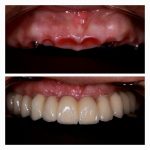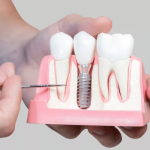Gingivitis is a very common form of gum disease that can lead to gum inflammation and irritation. The main culprits of this disease are poor oral hygiene habits, like not brushing or flossing enough, and a build-up of plaque and tartar on the teeth. To avoid more serious forms of gum disease, it's important to seek treatment as soon as possible.
The first step towards treating gingivitis is to improve your oral hygiene routine. This means brushing your teeth twice a day with a fluoride toothpaste, flossing daily, and using an antiseptic mouthwash. Your dentist may also suggest a professional cleaning to remove any built-up plaque and tartar.
If your gingivitis is more advanced, we may recommend a deep cleaning procedure called scaling and root planning. This procedure involves the removal of any plaque and tartar from the teeth and roots, as well as smoothing out any rough spots on the roots to prevent bacteria from building up.
In some cases, we may prescribe antibiotics to treat any bacterial infections that may be contributing to your gingivitis. These antibiotics may be taken orally or applied directly to the gums.
It's important to note that if gingivitis is left untreated, it can lead to more serious forms of gum disease like periodontitis. This can cause the gums to recede from the teeth, leading to bone loss and tooth loss. Therefore, seeking treatment for gingivitis as soon as possible is crucial to maintaining good oral health.
In conclusion, treating gingivitis involves improving oral hygiene habits, getting a professional cleaning, and possibly undergoing scaling and root planning or taking antibiotics. If you're experiencing symptoms of gingivitis like red, swollen, or bleeding gums, don't hesitate to book a consultation with your dentist. Early intervention can prevent more serious complications and help you maintain a healthy smile.








